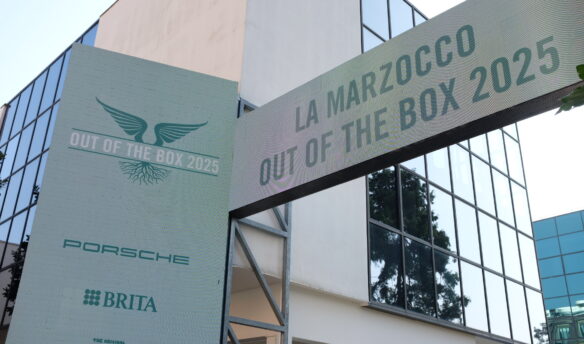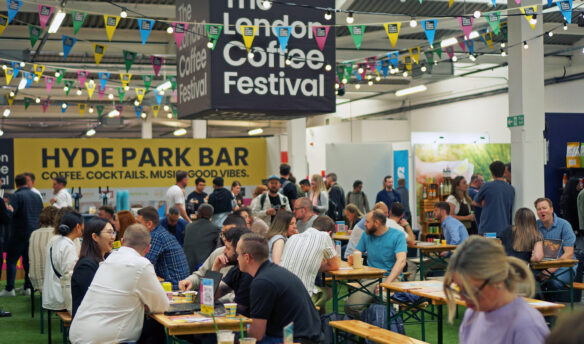A few weeks ago, I was asked to moderate a panel at the third-annual Austin Coffee Festival. The event was simply called “Leading Coffee Pioneers,” and featured three panelists who had each been in the industry for more than two decades.
All three panelists—Mike McKim of Cuvée Coffee, Joel Shuler of Casa Brasil Coffees, and Charles Emile Lauriat of Trianon Coffee—are coffee legends in Austin. But for those not in the city, here’s what you need to know about each participant:
- Mike McKim began roasting coffee in his garage in the early 2000s. In 2006, he opened Cuvée Coffee, one of the pillars of third-wave coffee in Austin. Cuvée was among the first coffee companies to can nitro cold brew in the United States.
- Joel Shuler is a licensed Q grader who founded Casa Brasil in 2005. His goal was to bring more Brazilian coffee to Austin. Casa Brasil has developed around its dedication to consumer education and transparency in farmer compensation.
- Charles Emile Lauriat began working at Trianon, one of the city’s oldest coffee shops, as a roaster in 2003. When the company fell on hard times in 2018 and was in danger of closing, he and his wife purchased the business.
The three leaders shared reflections on how they’ve seen the local industry change and what’s kept them engaged for almost two decades. Much of what they had to say was about how to stay passionate, and the importance of acknowledging the work of everyone along the coffee supply stream, from farmers to baristas.
Here are the ideas I found the most impactful from our panel:
The Industry Is Changing
To begin the panel, I asked each person how their opinions or ideas have changed since they started in coffee.
“I got brainwashed when I first got into the specialty coffee industry, [to think] that there was only one way to drink coffee [and that it] had to be brewed a certain way,” McKim said. He believed you couldn’t “add milk and sugar” and that he was “dogmatic” about his ideals and a “total coffee elitist.”
Now? He’s much more open-minded and thinks people should drink “coffee however you want.”
Lauriat said that while a lot of things have changed in Austin’s coffee scene, a lot has also stayed the same. “When I started, nothing was online. Everything was a dark roast,” he reflected. “But none of the stuff that makes coffee coffee has changed. It still takes people with passion. It takes a great product and good people delivering it.” Great coffee is what inspired him to get into the industry “20 years ago […] and it’s what still makes coffee great today.”
For Shuler, the financial viability of the industry has changed for the better. “When we got into coffee, there wasn’t much money,” he said. He pointed to early Austin coffee pioneers—like Cuvée and Trianon—as examples of businesses opened by people who “got into coffee not to make money, but because they love coffee.”
That said, he confessed to feeling skeptical about the current state of coffee business ownership. “When I saw more people from marketing or finance getting into coffee, I didn’t really take them seriously,” he said, while acknowledging that their unique resources have helped them stick around. “You’ve seen that those marketing people have been very successful—much more successful in some ways than us local coffee lovers—because they brought those skill sets and deep pockets.”
Despite initial skepticism, Shuler still sees hope in the coffee industry’s new entrants. “I think that it’s a good thing that people with money want to get into coffee,” he said, because that means more money for the industry as a whole.
He pointed to the Austin Coffee Festival as an example of something that wouldn’t have happened a decade ago, and as evidence that more people are willing and excited to spend money on coffee. “I don’t think I ever thought of coffee as being something that could be profitable,” he added.
Consumer Education in the Age of Automation
Shuler lives in Brazil and manages his business, which is based in Austin, from a distance. He said it’s still difficult for him to communicate the work he’s seeing on coffee farms.
“Brazil produces approximately 60 million bags of coffee. Every single lot of coffee is picked, dried, cupped, and tasted by somebody,” he said, noting that the amount of work needed to produce coffee can be challenging to communicate.
That’s always been the case, but with advances in AI, his concern is heightened. “We’re talking about AI and all these other things, but how are you going to maintain a very laborious, relationship-based supply chain?” he asked, questioning how people understand the work involved in coffee growing.
McKim agreed that automation can disguise the work required to make coffee. “Everybody wants quality, but they don’t necessarily want to pay a premium for quality,” he said. “If I want to buy quality coffee, I pay more for that coffee. If we want to be profitable, we have to charge more for that coffee.”
For him, that struggle is ongoing. “It’s a challenge to meet the consumer wherever they are.”
Culture Remains Paramount
All three panelists agreed that creating a positive company culture is central to sustained success in the industry.
Lauriat believes that’s been central to the longevity of Trianon. “We want to create this space where people can come in and feel comfortable and find things that they like,” he said. “You also want a community that understands the changes you have to go through to be successful.”
McKim discussed the importance of hospitality and meeting customers where they are. “I always tell my staff, ‘This is not your opportunity to dazzle people with your knowledge of coffee. It’s your opportunity to serve them and treat them with respect, make them want to come back, and make them want to give you a tip.’”
He said that doing so can be hard for people who are deeply invested in their work. “That’s a delicate balance because when you’re passionate about coffee, you want to share with people.”
Shuler added that if you really love coffee, it should be an experience you want to share. “Do what’s right and create beauty,” he said. “Treat the people who deal [coffee] across the supply chain fairly, and treat your employees fairly.”
He also encouraged fellow business owners to really consider their customers. “Think about the person that’s going to consume our coffee. We say every instance is immaculate. Try to remember that bag of coffee might be one in hundreds you’re producing that day, but for the person that’s going to open that bag, that’s their one bag of coffee. Their experience [lies in] the way the bag is folded, the way that the sticker is put on the bag—all of that is going to be extremely important.”
The Secret to Longevity
The three panelists have a combined 60-odd years in the industry. So what’s the secret to staying—and thriving—in coffee for so long?
“If you’re trying to start a coffee business, you need to be passionate about coffee,” said Lauriat unequivocally. “Without that, what do you lean back on for your inspiration? Sometimes selling and working really hard, long days are hard, and if you don’t have that inspiration to lean back on and really fire you up, you can’t really put yourself out there in a way that really represents you.”
“Do not make any decisions based on what you think your peers are going to think or say,” McKim added. “Make all your decisions based on your consumer, who your consumer is, and what they want—don’t worry what all your peers in the coffee industry might think or say about you.”
Shuler built on the idea of passion, and counseled would-be coffee pros to explore new avenues to further their careers outside of the coffee shop or roastery. “Coffee is so vast that there are so many different pathways and so many different niches. Follow what you love to do,” he said. “There are a lot of jobs and ways you can make a difference in people’s lives, make a difference in your own lives, and have a sustainable income along the way—maybe not a huge income—but sustainable.”
Even 20 years in, Shuler said he still finds excitement everywhere. “I’m still fired up by coffee,” he said. “I still love that special afternoon cup; I like taking my time with it. I like the community. I like the interaction, the experience of drinking coffee with somebody, and experiences with my customers across the counter everywhere. It’s all very rewarding, and all that keeps me coming back.”








